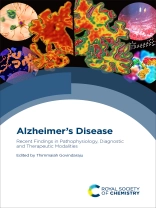Alzheimer’s disease is an increasingly common form of dementia and despite rising interest in discovery of novel treatments and investigation into aetiology, there are no currently approved treatments that directly tackle the causes of the condition. Due to its multifactorial pathogenesis, current treatments are directed against symptoms and even precise diagnosis remains difficult as the majority of cases are diagnosed symptomatically and usually confirmed only by autopsy. Alzheimer’s Disease: Recent Findings in Pathophysiology, Diagnostic and Therapeutic Modalities provides a comprehensive overview from aetiology and neurochemistry to diagnosis, evaluation and management of Alzheimer’s disease, and latest therapeutic approaches. Intended to provide an introduction to all aspects of the disease and latest developments, this book is ideal for students, postgraduates and researchers in neurochemistry, neurological drug discovery and Alzheimer’s disease.
表中的内容
Alzheimer’s is a Multifactorial Disease;
The Genetic and Biochemical Basis of Alzheimer’s Disease;
Alzheimer’s Disease Pathology: A Tau Perspective;
Structural Insights Into the Amyloidogenic Ab and Tau Species in Alzheimer’s disease Pathophysiology: Defining Functional Motifs for Therapeutic Interventions;
Structural Insights on Aggregation Species of Ab and Tau, and Their Implications in Alzheimer’s Disease;
Aggregation Species of Amyloid-b and Tau Oligomers in Alzheimer’s Disease: Role in Therapeutics and Diagnostics;
Role of Metal Ions in Alzheimer’s Disease: Mechanistic Aspects Contributing to Neurotoxicity;
Microglial Blockade of the Amyloid Cascade: A New Therapeutic Frontier;
Post-translational Modifications and Alzheimer’s Disease;
Autophagy: Role in Alzheimer’s Disease Pathophysiology and Therapeutic Avenues;
Transmission of Pathogenic Proteins and the Role of Microbial Infection in Alzheimer’s Disease Pathology;
The Role of Gut Microbiome in Alzheimer’s Disease and Therapeutic Strategies;
Molecular Probes for the Diagnosis of Alzheimer’s Disease with Implications for Multiplexed and Multimodal Strategies;
Circulating Biomarkers for the Diagnosis of Alzheimer’s Disease;
Lactoferrin: A Potential Theranostic Candidate for Alzheimer’s Disease;
Multifunctional Inhibitors of Multifaceted Ab Toxicity of Alzheimer’s Disease;
Tau-targeting Therapeutic Strategies for Alzheimer’s Disease;
Computational Development of Alzheimer’s Therapeutics and Diagnostics;
Targeted Protein Degradation as a Therapeutic Avenue for Alzheimer’s Disease;
Cell-based Therapy for Alzheimer’s Disease;
Experimental Models to Study Alzheimer’s Disease;
Ethnic and Racial Differences in The Pathophysiology of Alzheimer’s Disease












